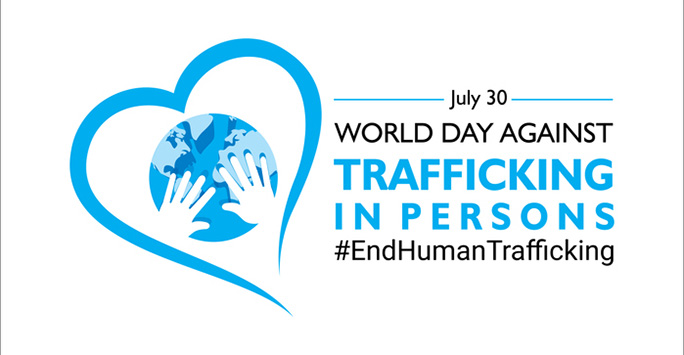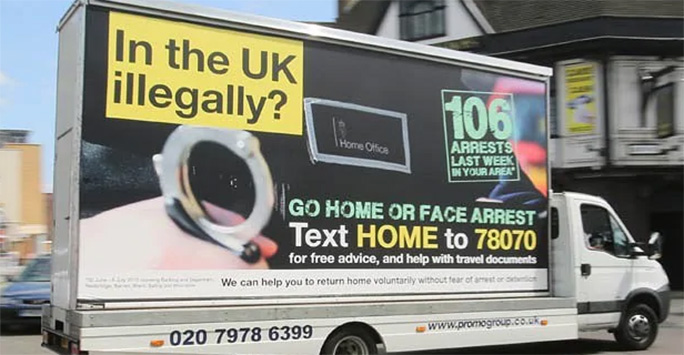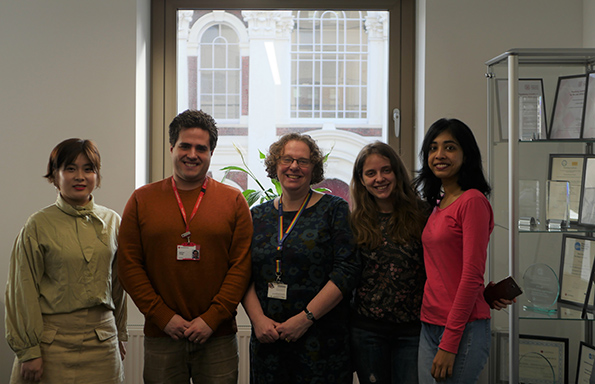
World Day Against Trafficking Persons takes place annually on the 30th July, it serves as a reminder of the millions of people across the globe who are victims of human trafficking and modern-day slavery. Jo Bezzano, an in-house solicitor at the Liverpool Law Clinic, provides legal assistance and support to victims of trafficking. In this blog, Jo discusses the difficulties victims of trafficking face when dealing with government systems, the complex nature of their situation and why the provision of legal aid is imperative in helping to protect and support victims of trafficking.
The judge, in sentencing Ms X* to 15 months in prison, remarked:
“The description you gave of your life as an illegal immigrant was pitiable...It amounted to being an economic slave...It is palpably clear that sophisticated gangsters are using people like you to harvest the production of cannabis…"
This was in 2007. Clearly the Judge recognised that Ms X had been exploited but, at the time, neither the Prosecution nor the Judge (or it would seem Ms X’s own defence lawyers) were concerned that she might be the victim of forced criminality.
When she was Prime Minister, Theresa May described modern slavery as ‘the great human rights issue of our time'. As Home Secretary, she was responsible for the Modern Slavery Act 2015. This brought existing offences into one law and created new enforcement powers relating to human trafficking and modern slavery. It also provided for protection for victims and importantly, for people like Ms X, a statutory defence to criminal prosecution for victims of trafficking.
At the same time, Theresa May was presiding over the ‘hostile environment’. This was a policy designed to make life as difficult as possible for migrants who were in the UK without legal status and by doing so to persuade them to return ‘home’ voluntarily.

The Governments' controversial pilot scheme Operation Vaken, also known as the 'Go Home' vans, took place in six London boroughs between July and August 2013 to encourage those living illegally in the UK to leave voluntarily and avoid being arrested.
In reality, the ‘hostile environment’ policy and continued human trafficking are intrinsically linked. Much Home Office decision making continues to be driven by the overriding objective of either persuading or forcing people to leave the UK. Victims of trafficking are often fearful of authority and particularly of the Home Office. Migrants (including victims of trafficking) frequently believe that the Home Office wants to remove, deport and detain them.
Back to Ms X. The Liverpool Law Clinic is an in-house legal practice. We agreed to look at Ms X’s case and first met her in December 2018. She had no legal status and was living in the UK illegally. In the years since her conviction and imprisonment she had, on several occasions, been detained by the Home Office – for periods of months at a time. She had been through the official government system for identifying and supporting victims of trafficking (the National Referral Mechanism or NRM) twice. Through this identification process the Home Office had concluded that she was a victim of trafficking (including forced criminality and sexual exploitation). She was first officially found to be a victim of trafficking in 2016. The process did not result in any change to her legal status - she still had no ability to work legally or claim benefits. Ms X continued to be vulnerable to exploitation. She went through the NRM process in 2017 for a second time and was found, again, to have been the victim of trafficking and exploitation. Even with these two findings, the first of which went back as far as the events around her conviction in 2007 and the second events from 2016 onwards, her situation remained unchanged. With no immigration status, she still had no ability to support herself, obtain housing and remained vulnerable to further exploitation. She was unable to return to her home country, for reasons beyond her control – something which the Home Office failed to explore in any of their dealings (beginning in 2007) with her or her case.
As time goes on the legal situation of an individual tends to gather in complexity. This happened to Ms X. When we obtained her files from the Home Office in the spring of 2019 the papers ran to hundreds of pages. After hours of painstakingly picking through the files we began to build a coherent picture and history. We found that Ms X was most likely ‘stateless’ and that she had made an application for leave to remain as such to the Home Office in 2016. The Home Office had refused this without any substantial consideration because of the criminal offence (and accompanying deportation order) from 2007. This was despite the fact that (a different part of) the same Home Office had found that she was a victim of trafficking including forced criminality.
The ending is (compared to the rest of the story) a better one. Our careful reading of the Home Office file showed that they had made a decision that they seemed unaware of in early 2018. This was to treat an interview with Ms X as a fresh claim for asylum. Having recorded an asylum claim the Home Office had to make a decision on it. We pushed for a decision on this claim. The first time we felt there was real progress was when the Home Office made a decision on this claim – a refusal. A refusal would by normal standards be a failure. But this one came with a right of appeal to the Immigration Tribunal so by immigration standards was a success.
We lodged the appeal. Around the same time, Ms X made a further application for leave to remain (based on her statelessness) to the Home Office. We found the evidence for this application in the notes and entries on the Home Office file. We explained to the Home Office what their files had disclosed to us – that Ms X was stateless and that their notes showed that they were aware of this and that she could not return (or be returned) to her home country. We also argued that it was unreasonable and unlawful to continue to rely on a criminal conviction that the Home Office itself had found to be connected to trafficking. We showed them the evidence that Ms X continued to be vulnerable to trafficking and exploitation.
Ms X had to attend the Immigration Tribunal for her asylum appeal. Her previous experience of court had resulted in a prison sentence and she was extremely traumatised, worried and confused. But it was only when we got into to the Tribunal that the Home Office began to engage properly with the case. The Judge adjourned the case and raised questions with a time table for the Home Office to deal with the issues.
Over the following weeks the case was handled by officials with more professionalism, efficiency and courtesy. Thankfully, Ms X did not have to return to the Tribunal. The Home Office agreed that she should not be deported and they granted her leave to remain as a stateless person.
Unravelling the complexities of Ms X’s case from 2006 – 2020 took hours and hours of specialist legal work. Had we not had the time, resources and expertise to do this and to get the case before a Judge it is likely that the Home Office’s intractable position would have continued.
People like Ms X often need specialist legal help. A person’s situation may (as Ms X’s was) be complex with interrelated criminal, immigration and trafficking issues. It is likely to have become more complex over time and with each official interaction. Or, they may have avoided the Home Office and police altogether because of fear arising from their previous experiences or due to the types of policies developed under the influence of the hostile environment. A person may be treated as a victim of trafficking by one part of the Home Office but an illegal immigrant and a target for enforcement by another.
Unfortunately, for many people, the kind of legal advice they need is unavailable. Successive cuts to legal aid have reduced the numbers of practitioners working in this area and constrained what those who are left have the resources to do. Practitioners in this area describe the sector as being at breaking point.
Over the coming months we will be carrying out empirical research to examine in more detail the extent to which the core needs of victims, particularly those relating to their legal status, are met. My legal casework in this area suggests that a combination of poor Home Office decision making and a lack of access to adequate quality legal advice to challenge can enable the cycle of vulnerability and exploitation to continue.
In Ms X’s case it was not that Home Office decision-makers actively disbelieved her, but that they failed to read their own records or follow their own policies. The Home Secretary wearing one hat found Ms X to be a victim but wearing another treated her as an illegal immigrant.
* Ms X consented to her case being included, as an example, in this blog. Her name has been anonymised and other personal details not included to protect her privacy.
......................................................................................................................
Jo Bezzano is an in house solicitor in the Law Clinic. She has been working, with Dr Matthew Young of the Red Cross and law student volunteers, on trafficking cases. With Dr Samantha Currie, she is working on research bringing together practice based findings with academic analysis.

Jo Bezzano (centre), with Dr Matthew Young of the British Red Cross and students Meichen Lu (student intepreter), Ana Marija Apostoloska and Irene Bubu worked together on the Anti-Trafficking Project. Jo won Partnership of the Year 2019 at the Liverpool University Staff Awards 2019 for her work with Dr Matthew Young.